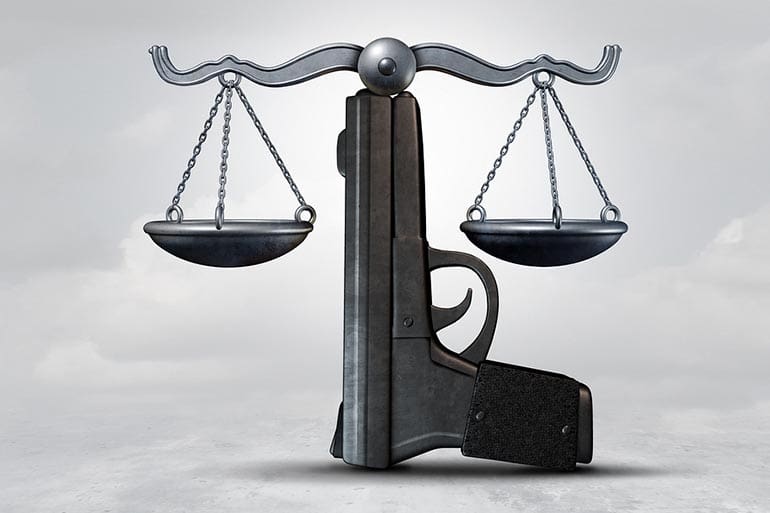Our recap this week starts off with a sad end to one federal judge’s notorious fulfilling of his Constitutional duty to apply the law as written. Judge Benitez’s order stopping California’s “high capacity” magazine ban was outstanding, and one of the most firearm-literate pieces of judicial writing I’ve read to date. Truly worth a read if you haven’t checked it out yet. But the candle that burns brightest, it seems…

Prop 63 v. Judge Benitez
This technically happened last week, but it was after this east-coast-dweller was done writing for the day. We all know about U.S. District Court Judge Roger Benitez, who has written several outstanding gun rights opinions, struck down California’s Proposition 63 and the high cap mag ban in Duncan v. Becerra. Proposition 63 eliminated the “grandfathering” of “high capacity” magazines in CA. Because of this, California saw more magazine sales in a single day than in the last election cycle, as sellers nationwide worked tirelessly to flood the postal system with magazines of all shapes and sizes.
Now, the judgment is being stayed in part pending appeal, meaning the mag ban will partially go back into effect. It seems though that magazines imported into California before the 5PM April 5th stay goes into effect are still covered. Meaning California is blocked from enforcing the ban against those magazines imported before 5PM April 5th.

The Violence Against Women Act
This is an interesting one, and could be a case study on bad ideas coming in great sounding packages. The VAWA was first passed in 1994 and enjoyed bipartisan support. It was intended to help victims of domestic violence through various means, including restricting the ability of serious offenders from arming themselves. The law comes up for renewal every few years, and has gone through without major change for over two decades. Now, though, the bill was let to lapse, and lawmakers incorporated major changes. Changes that seriously expand who can have their gun rights taken under the VAWA.
Two changes stand out as problematic. Previously, VAWA prevented anyone who had ever been convicted of felony crimes of domestic violence from buying a gun, but now includes misdemeanor convictions. Now, one might agree that there are reasons to keep guns out of the hands of those convicted for domestic violence, even at the misdemeanor level. There is a lot more at play with this change than first meets the eye.
For one, the prohibition on buying a gun isn’t limited to a certain term. It’s lifelong, with no means of reversal available. This means that someone convicted of a misdemeanor charge, say at 18, could spend the rest of their life volunteering for a battered women’s shelter, helping old ladies cross the street, and feeding unwanted kittens without ever being allowed to own a gun. When we think of punishments for misdemeanors, we think of jail time under a year and fines. Not an irrevocable lifetime of stunted civil rights.
The bill also “closes” what lawmakers are calling the “boyfriend loophole.” (Which is clearly not a loophole, but intended in the law.) VAWA previously allowed law enforcement to strip those who were living with or married to a person they had been convicted of abusing of their firearms.
This was clearly intended to treat those situations where the victim and abuser are still in close proximity, where the risk of a repeated attack is high, and thus the severe measure of permanently stripping the abuser’s rights made more sense. Now, though, language has been added applying the same conditions to current and former “dating partners,” regardless of cohabitation. This seriously expands the reach of the provision, far beyond the scope of its original intention.
Whether you agree with the provisions or not, the fact is that these are significant changes, greatly affecting the rights of many Americans, who may have been convicted years ago and reformed. Don’t be fooled by attempts to frame gun rights supporters as anti-women or anti-victim. Major changes to our national criminal justice system should be openly debated, not snuck into an update of a popular bill.

Pittsburgh’s Micro Gun Omnibus
On Tuesday, Pittsburgh’s City Council passed, by a 6-3 vote, mini municipal versions of all the hot gun controls now. Their own lil’ bitsy “assault weapon” ban, a ban on “armor-piercing ammunition and high-capacity magazines”, and their very own lil’ red flag law! Just like a big government! Only problem is that the Pittsburgh City Council isn’t allowed to play with those toys. Pennsylvania, like many states, blocks municipalities from regulating firearm ownership.
While it’s fun to poke fun at city councils, who are overwhelmingly run by people with little knowledge and tremendous amounts of time, these laws aren’t “little” for the 300,000 people of Pittsburgh. Even though their actions are illegal, that doesn’t do much to quell the very real threat of zealous local law enforcement who might enforce the measures before successfully challenged in court. A 6-3 vote to subject 300,000 to the threat of criminal prosecution for an issue so divisive is exactly why PA took these matters out of municipal hands. Gridlock is a blessing, not a curse.

Oregon’s Mini Omnibus
Oregon’s Senate Judiciary Committee heard testimony on Tuesday for a package of potential gun restrictions. They include allowing dealers to require all firearm purchasers to be 21 (whatever), a safe storage requirement (how these would be enforced is beyond me), and restricts the sale of 80% and 3d printed firearms (which, I’m sure they’re blissfully unaware, the entire point of which are that you don’t buy them as a firearm).

New Mexico Background Check Industry Struggles With State Law
Background check zealots in Santa Fe are struggling to get universal background checks (including private transactions) on the state ballot. The only problem is the groups can’t seem to follow the state requirements to get such a measure on the ballot.

New Zealand Didn’t Check Their Homework
As we know, because of their use of a system wildly unlike our own, New Zealand lawmakers are able to do more or less whatever they want at breakneck speed and with reckless abandon. That seems to be showing now, as the incredibly vague expanded language of New Zealand’s gun law as it related to “attachments” may accidentally render all guns illegal, according to New Zealand advocates. Again. Gridlock is a blessing.








